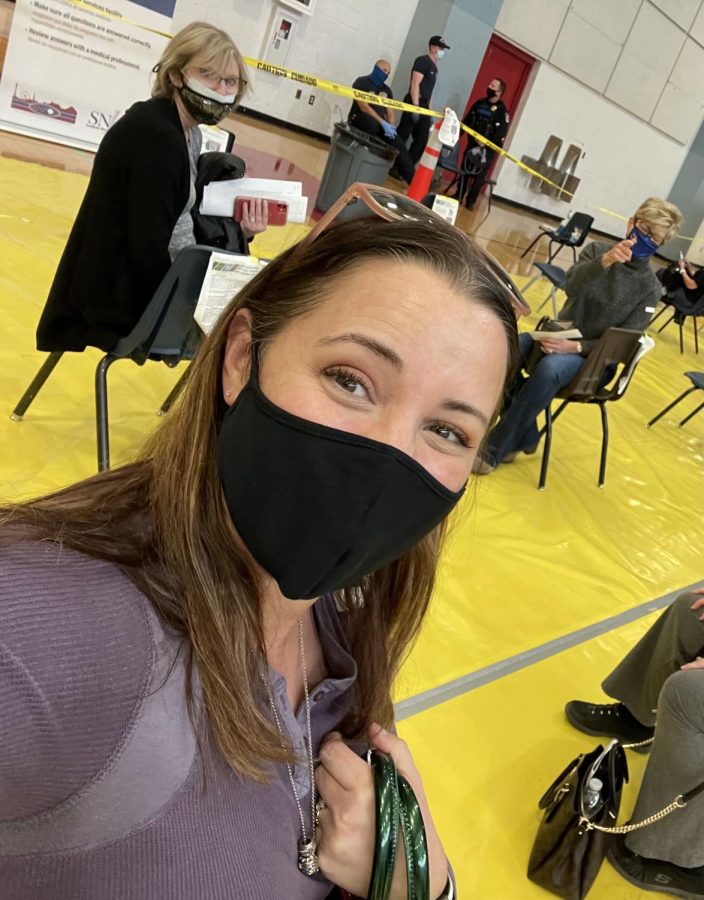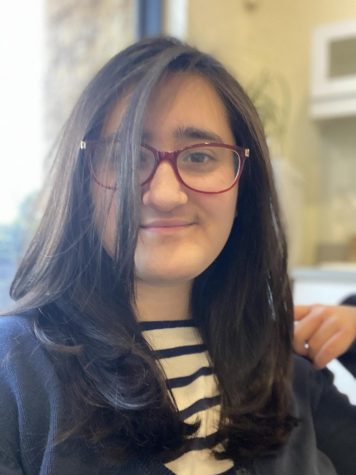Teachers receive COVID-19 vaccine, prepare to return to schools
Teacher vaccinations
Rebecca Krshul and Deborah Whitt receiving their first doses of the Moderna vaccine on Jan. 20 at Western High School.
March 8, 2021
Like many others, Spring Valley teacher Alexis Fukuda didn’t expect the COVID-19 pandemic to last as long as it has. Though Fukuda, who teaches Japanese, had initially hoped that school closures in March 2020 would be drastic enough to reduce the rapidly growing number of cases in Clark County School District, she soon realized that the virus that’s claimed over 400,000 lives in the U.S. wouldn’t be such an easy foe to conquer.
As vaccines continue to be rolled out across the nation, teachers such as Fukuda, who got her first dose of the Moderna vaccine on Jan. 23 and her second on Feb. 20, said that they’re excited to be among the first to receive them. They hope that it will put students back in classrooms as soon as possible.
“The vaccines will absolutely be the solution to ending the pandemic,” Fukuda said. “Everyone has someone in their life that they love and want to keep healthy. This vaccine is as much about saving you as it is about saving them.”
While many teachers said that they were excited about the opportunity to get the vaccine, many are still hesitant about being able to return to schools this year, believing that vaccinating just teachers won’t be enough to completely prevent the spread within classrooms.
“I had no apprehensions about getting the vaccine,” Fukuda said. “It’s certainly one great step toward opening our schools back up, but just having teachers vaccinated isn’t enough. The entire community needs to be vaccinated so that students don’t pass the virus to each other or bring it home with them and infect their family members. … There is still a lot of work to be done before it is safe to go back to school.”
Publications teacher Rebecca Krshul, who received the first dose of the vaccine on Jan. 20 and her second on Feb. 10, agrees that teacher vaccinations won’t be enough, saying that it puts more direct pressure on the teachers within the classrooms to keep students safe. While Krshul said that she was “extremely happy” about teachers having access to vaccines, she’s still not fully comfortable with her newfound immunity.
“I feel like I have no immunity that means anything to the people I care about,” Krshul said. “Being the only person in your family who has only gotten a … dose does nothing for my children, husband, parents who are still very much at risk for the virus. I am extremely happy we are making progress toward safety, but we are nowhere near the level where I am excited yet.”
Despite the desire for students to return to classrooms as quickly as possible, some teachers have been turned away from vaccination sites, and some feel that the process has been far from smooth.
“CCSD did not handle the vaccine roll out well at all,” said Amy DeVaul, who teaches English. “They gave us no information, then they said we could sign up –– then they turned us away and said ‘No,’ then they said ‘Yes’ again. I think it shows the lack of planning on the part of [the] central office. They want us to open but don’t want us to be vaccinated quickly.”
While Krshul said that she was initially “nervous” about getting such a new vaccine, she trusts in science and “credible sources” to keep everyone safe. Fukuda and DeVaul also expressed joy that the world worked together to create a vaccine so quickly, but they felt discontent with the politicization of the vaccination process.
“I am overjoyed that quite literally the entire world united to create a vaccine for this virus,” Fukuda said. “It reminded me that when humanity wants to do something good, it can. … I hope we move toward an era where science is trusted and is not a ‘left’ or ‘right’ issue. Everyone gets sick, not just Democrats or Republicans. I hope the politicians let the scientists work without attaching it to some political agenda.”
Most of the teachers also said that they agree that the pandemic didn’t need to last as long as it has, drawing inspiration from pandemics the world has faced in the past. Some believe that the government should’ve implemented mask mandates sooner, while others blamed politicization for the pandemic’s strength.
“I think there are plenty of world-wide examples that show this escalation was not inevitable,” Krshul said. “Although perhaps looking at America and the freedoms people expect, maybe in fact we should say it was inevitable. I believe if we had national mask requirements, we could have slowed down the spread because companies would have had that on their side instead of trying to decide when and where people should have to wear a mask.”
As many remain hopeful that the vaccine will bring the end of the pandemic, some teachers are still concerned about the future of schools and learning.
“The hardest part was walking into an empty classroom and trying to do my job the best way I know how,” DeVaul said. “This online format doesn’t let me do that, and I found my mental health really suffering in the beginning of the school year. I had to adjust a lot of things and reach out to other teachers who felt the way I did just to talk things through.”
Regardless of the pandemic’s reach and longevity, some teachers say that they are still excited to see the end nearing. For Fukuda, she said that she’s most excited about being able to see her 94-year-old grandmother in Japan this summer. But for many others, their request is as simple as seeing students back in classrooms.
“I miss being able to be in a class with students and the carefree thought of walking down a crowded high school hallway without a worry,” Krshul said. “I miss laughing every day at things students say or share. I am so grateful we are slowly making progress to make those moments possible again.”



